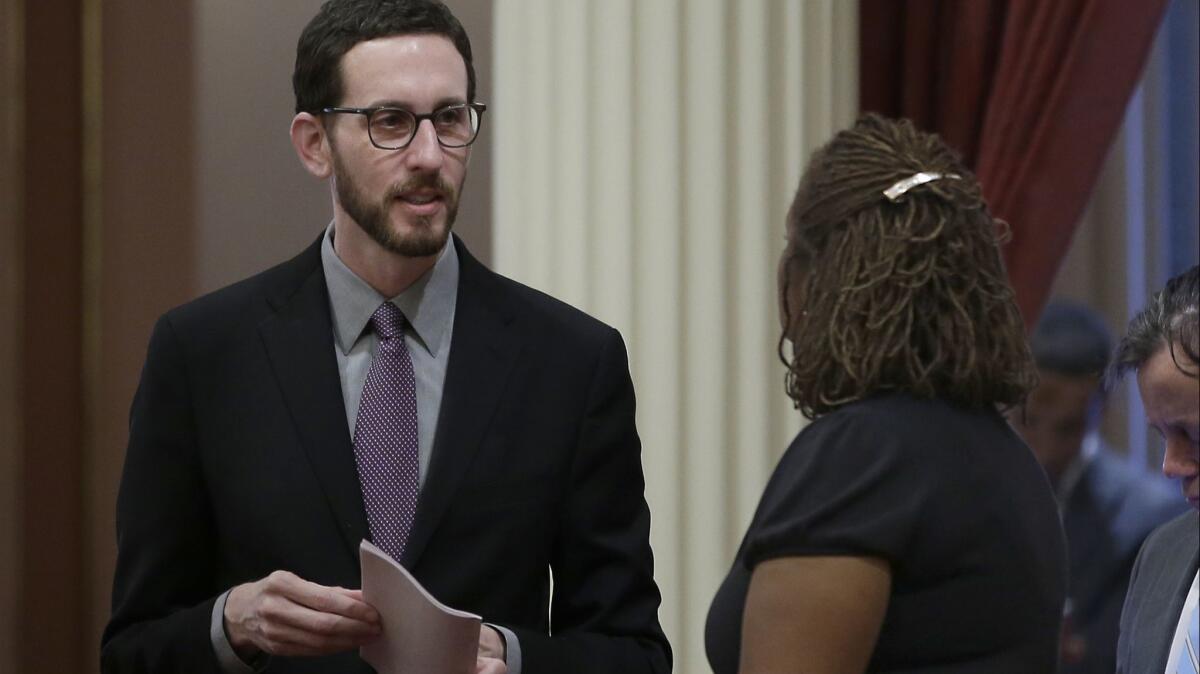Net neutrality rules move past first hurdle in California

Reporting from Sacramento — A proposal that would restore net neutrality in California advanced in the state Senate on Tuesday with changes that scaled back some of its provisions.
Under the version of the legislation that passed in committee, the state’s utilities commission would not monitor or enforce net neutrality rules, a power that would instead fall to the state’s attorney general. Companies also would not have to adhere to net neutrality rules as part of cable franchise agreements or as a condition for obtaining state contracts to install broadband across the state.
Lobbyists for industry groups and major internet providers — including AT&T — said the proposed law is still complex, confusing and could cause companies to pass on more costs to consumers. Technology advocates were disappointed to see the state contracts provision cut, but cheered its approval.
Sen. Scott Wiener (D-San Francisco), who introduced the proposal, said the latest version maintains its key objective, ensuring fair access to the internet and preventing providers from choosing winners and losers based on how much they pay for services.
“The bill fully protects net neutrality in California,” he said. “I’m very grateful to the committee and the chair for working with us and passing the bill.”
California is trying to bring back net neutrality, but the debate is complicated »
Federal net neutrality rules, established under then-President Obama in February 2015, barred companies such as AT&T, Charter and Verizon from selling faster delivery of some data and slowing speeds for certain video streams and other content.
But the Federal Communications Commission voted in December to roll back those rules, with Republicans calling for an end to the utility-like oversight of internet providers.
Since then, states and cities across the country have sought their own ways to ensure companies maintain neutral access to the internet. But tech experts say none have gone as far as Wiener’s legislation.
The legislation, Senate Bill 822, is one of two bills this legislative session that would bar internet service companies from slowing or interfering with customers’ internet access based on the type of content or service they’re trying to access.
A bill by Sen. Kevin de León (D-Los Angeles) takes a narrower approach and would task the California Public Utilities Commission with establishing new net neutrality rules.
At Tuesday’s hearing, Wiener said he crafted the amendments with the Senate Energy, Utilities and Communications Committee to address concerns from lawmakers that the historically embattled commission wouldn’t be up to the monumental task of enforcing internet regulations.
The latest version of Wiener’s bill also gives the state attorney general’s office the power to enforce rules governing providers’ quality of service and zero-rated data plans, which exempt some data from counting against a customer’s data plan.
State lawmaker unveils proposal to preserve net neutrality in California »
Rob Tappan, spokesman for Broadband for America, said in a statement that state-level net neutrality regulations could create “a maze of competing rules that would likely increase the cost of Internet service, create confusion among customers and diminish investment in the expansion of high-speed broadband infrastructure.”
Stanford Law School professor Barbara van Schewick countered that stance, saying internet providers could simply pay for the infrastructure themselves. Meanwhile, a lack of competition means residents in parts of the state have access to only one internet provider, a situation she says the lack of net neutrality regulations will exacerbate.
“The problem is not that we need to get them more money that they don’t already have,” she said. “The problem is that we don’t have competition.”
More to Read
Get the L.A. Times Politics newsletter
Deeply reported insights into legislation, politics and policy from Sacramento, Washington and beyond. In your inbox three times per week.
You may occasionally receive promotional content from the Los Angeles Times.











